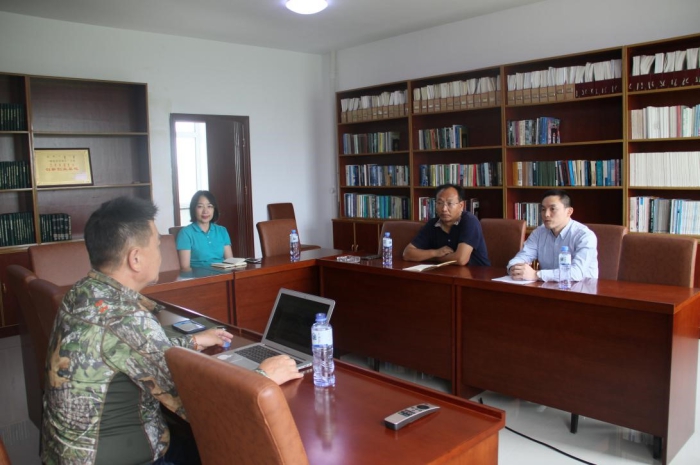On July 29, 2018, FANG Yunting, deputy director of the Institute of Applied Ecology (IAE), Chinese Academy of Sciences, paid a visit to Erguna Station and held talks with Chuluun Togtokh, professor of the National University of Mongolia (NUM), on cooperation projects under the “One Belt and One Road Initiative”. WU Yunna, professor and chief of the Student Affairs Department of Dalian Nationalities University participated in the negotiation activities.
On the afternoon of July 29th, WANG Zhengwen, the head of Erguna Station, talked to the visitors about the history, the main functions and tasks, and the researches of the station. FANG fully affirmed the establishment of the station and the achievements it has made. He share with professor Chuluun Togtokh the information concerning the “One Belt and One Road Initiative”, including the research and talent exchange programs funded by the Chinese Academy of Sciences, the National Nature Science Foundation and the Ministry of Science and Technology of China. He also expounded the specific plans of cooperation between IAE and NUM in various fields such as grassland ecological research, academic exchange and personnel training. Professor Chuluun Togtokh said that these cooperation plans were substantive and operative and they would be able to help NUM with the development of related disciplines as well as the improvement of scientific research. The two sides agreed to urge higher-level exchange of visits between IAE and NUM during the year.
After the meeting, WANG accompanied FANG and the visitors to the infrastructure of the station, such as: dormitory, laboratory, lecture hall, data room, specimen room and canteen. Subsequently, FANG and the visitors investigated the field experimental plots of Erguna Station to learn more about the objective, significance and results of each experiment. FANG pointed out that these experiments are of great significance for predicting the ecological consequences of global change, innovating the theoretical system of ecology, and supporting the long-term development of grass industry and animal husbandry in Hulunbuir. He encouraged Erguna Station to make full use of its geographical advantage (adjacent to Russia and Mongolia) to carry out international cooperation and exchange, and make greater contributions to the development of China's ecological science and regional economics.
